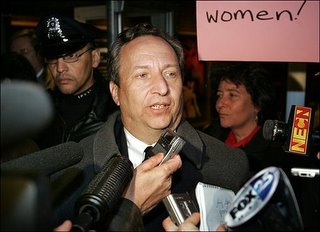
The Chronicle of Higher Education reports that Larry Summers has resigned [here]. He had been treated by most bloggers as something of a hero for standing up to radical feminists and race hustlers, and his stances on those kinds of issues certainly made him controversial. But that's not what brought him down. It seems that Summers brought Clintonian ethics with him when he moved from Washington to Cambridge. Summers' support for a senior economics professor (Andrei Schleifer), who was a close personal friend, against charges that Schleifer had defrauded the government ultimately cost Harvard 44 million dollars in legal fees and penalties. Not only did Schliefer enjoy legal support from Harvard, he was also promoted during the controversy. The whole situation gave Summers' opponents in the Arts and Sciences faculty the ammunition needed to force him to resign.
The New York Times makes no mention of his conflicts with radical ideologues or possibly fraudulent dealings, and reports that the reason for his resignation was faculty anger over the resignation of the Dean of Arts and Sciences, who Summers was reputed to have forced out. [here]
The WaPo, in a spectacularly uninformative article, reports that the problem was that Summers couldn't get along with faculty and wouldn't accept the fact that they were smarter than him. They do, however, note that the student body overwhelmingly supported him.
Robert Johnson, over at HNN, provides an interesting nugget of information [here]:
The original draft of the 2005 faculty resolution [to issue a vote of "no confidence"] listed three specific events justifying a motion of no confidence: the president’s remarks about women in science; his handling of the Cornel West matter; and his denunciation of a proposed faculty resolution urging Harvard to divest from firms doing business in Israel.Johnson goes on to assert that had he taken opposite positions on these three issues Summers would not have been forced out. The suggestion is that ideological conformity, rather than shady dealings lay at the heart of the Summers affair. In this regard I find it interesting that the student body sided with Summers against the faculty. I find this encouraging because it suggests that the blatant attempts at ideological indoctrination that characterize much of academia are not working.
In a way I'm sad to see Summers go. The Harvard faculty, and especially the College of Arts and Sciences has been badly in need of reform for a long time. Summers was starting to clean house, and his downfall will allow things to return to their corrupt and comfortably conformist groove.
UPDATE:
See also the comments over at Tim Burke's blog, "Easily Distracted" [here]. The question being debated is whether Summers was brought down by ideological pressures, or by personal incompetence.
AND THERE'S THIS:
Stanley Kurtz down on the Corner suggests that Summers' problem was that he was "sane".
Read it here. Kurtz provides links to other commentary along this line.The New York Times notes that Summers knew he had to go when colleagues from the Clinton administration told him so.
The Times adds that Summers is thinking of advising a Democratic presidential campaign. There you have the explanation for Summers' appeasement. Summers is from the sane side of the Democratic Party (yes, there is one). These moderate Democrats want to bring the academy closer to the center of the country. But when push came to shove, the leftist faculty wouldn't play along.
That left Summers and his moderate Democrat backers on the board to choose between appeasement and a serious public battle. Ultimately, Summers and his allies backed down because they are part of the same national political coalition as the leftist faculty (which contributes heavily to the Democratic Party). Moderate Dems would be happy to reform the academy, but they don't have the stomach to treat leftist professors as open opponents. Only Republicans can do that. So in a way, we are seeing another iteration of the paralyzing split between DLC types and the fire-breathing base. The Democratic left is just too big, too powerful, and too essential to victory to be purged, as Peter Beinart wanted to do.
And, Dershowitz chimes in that Summers was the victim of a radical coup. [here]
UPDATE:
Marty Peretz says that Summers' problem was that he didn't join the "herd of independent thinkers." He writes:
Summers's arrival at Harvard was bracing. The Harvard Corporation had finally decided to bring the university into modern times, and it had chosen an at once dazzling and sober intellectual to do it. You could feel the walls of the faculty club tremble.Read it here. (subscription required)
And Peter Beinart has a similar take here. Not surprising since Marty signs his paychecks. I particularly like this part:
Perhaps none of this really matters. In this era of conservative power, in which politicians are more likely to run against America's top universities than to learn from them, Harvard is largely irrelevant. But that was part of Summers's project: to challenge the narcissism that makes Harvard easy to ignore. It's why he has made it easier for students to participate in rotc. It's why he waived tuition for families making less than $40,000 a year. It's why he wanted professors to do useful research and students to learn basic knowledge. As one of the few contemporary college presidents who tried to turn liberal ideals into government policy, rather than just opining about them from the ivory tower, he wanted Harvard to serve the nation, not merely itself. And, when Harvard hired him five years ago, that's what it said it wanted, too. Now we know the truth.
No comments:
Post a Comment